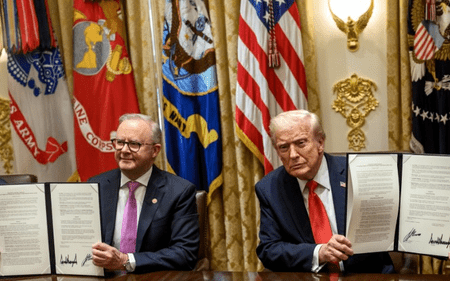Washington, Nov 20 – The US administration’s decision to move forward with AUKUS highlights its continued recognition of the Indo-Pacific’s strategic significance, according to analysts cited on Thursday. Over the past decade, the United States has helped establish a loose security architecture in the region, including AUKUS, the Quad, and the so-called “Squad,” designed to deter China’s growing influence.
Under the Trump administration, these security groupings faced scrutiny, raising concerns in allied nations such as Australia, Japan, India, and the Philippines. However, a recent meeting between President Trump and Australian Prime Minister Anthony Albanese confirmed Washington’s commitment to supplying Australia with nuclear-powered, armed submarines under AUKUS. This announcement ended months of speculation about the pact’s future and reassured allies about America’s strategic intent in the region.
Indian policy analyst Somen Chatterjee noted that while delivering submarines is vital, it alone cannot address the Indo-Pacific’s evolving security needs. AUKUS is intended not only to provide Australia with submarines capable of extended undetected operations but also to accelerate technological collaboration in areas such as cyber, AI, and undersea warfare — capabilities essential to counter China’s naval expansion and gray-zone tactics.
Chatterjee emphasized that Trump’s decision reflects recognition of strategic logic over transactional approaches with allies, but cautioned that reviving AUKUS is only the first step. The Quad, comprising India, the US, Japan, and Australia, and the Squad, a smaller frontline deterrence group, must also be reinvigorated to maintain a coherent Indo-Pacific strategy. The Quad serves as a multifaceted platform for governance and regional coordination, while the Squad provides immediate deterrence capabilities.
“China is testing red lines. Allies are hedging. Nations are recalculating dependence on the US,” Chatterjee wrote. “Reviving one pillar is not enough. A successful strategy requires investing in alliances and operationalizing all three mechanisms — AUKUS, Quad, and the Squad — to ensure a free, open, and rules-based Indo-Pacific.”
The report concluded that while AUKUS stabilizes one aspect of regional security, sustaining US influence will depend on restoring momentum across all allied frameworks in the Indo-Pacific.


















